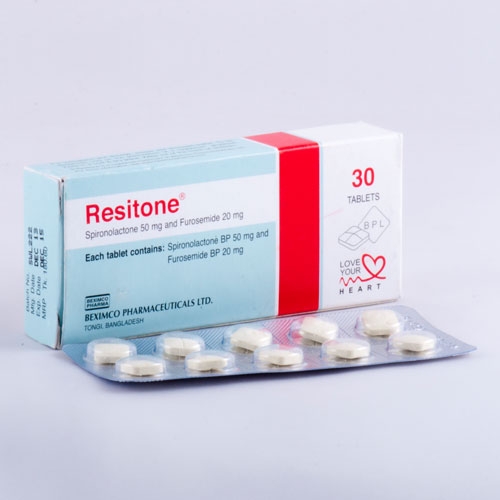ঔষধের বিস্তারিত বা বিকল্প ঔষধ জানতে ঔষধের নাম দিয়ে সার্চ দিন। যেমন- Napa বা Alatrol বা Amodis
Resitone 50mg
TabletSpironolactone
Beximco Pharmaceuticals Ltd
Other Strength:
Alternative:
- Spirocard 50mg

Resitone
1. What Resitone® is and what it is used for?
Furosemide & Spironolactone is a combination diuretic containing a loop diuretic, Furosemide and a potassium sparing diuretic, Spironolactone. Spironolactone and Furosemide have different but complementary mechanisms and sites of action. Therefore, when given together they produce additive or synergistic diuretic. The Furosemide component inhibits the Na+/K+/2Cl- co-transporter in the ascending Loop of Henle and blocks the reabsorption of sodium, potassium and chloride ions thereby increasing the quantity of sodium and the volume of water excreted in the urine. This characteristically induces potassium loss.
The Spironolactone component inhibits the reabsorption of sodium in exchange for potassium at the distal tubule by antagonizing the action of aldosterone so that sodium excretion is greatly favoured and the excess loss of potassium, indicated by the Furosemide is reduced.
Furosemide & Spironolactone is indicated for the treatment of
Congestive heart failure
Essential hypertension
Swelling due to excess fluid retention (edema)
Liver cirrhosis, with collection of fluid in the abdominal cavity (ascites)
Overproduction of aldosterone (hyperaldosteronism)
Resistant edema associated with secondary hyperaldosteronism
2. Before you take Resitone®
Do not take this medicine and tell your doctor if:
Furosemide & Spironolactone is contraindicated in acute renal insufficiency, anuria, hyperkalemia and in patients with a history of hypersensitivity to Furosemide or Spironolactone.
Do not take this medicine if the above applies to you. If you are not sure, talk to your doctor before taking Resitone®.
Take special care with Resitone®
It is recommended that individuals taking this medicine have their fluid and salt (electrolyte) balance monitored regularly.Furosemide & Spironolactone should be used with caution in diabetes, enlarged prostate (prostatic hypertrophy), hypotension, low volume of circulating blood (hypovolemia).
Taking other medicines
When taken together with ACE inhibitors or potassium salts there is an increased risk of hyperkalemia.
Spironolactone increases the levels of cardiac glycosides such as digoxin in the blood.
Spironolactone decreases the ulcer healing effects of carbenoxolone.
Corticosteroids such as hydrocortisone may also cause potassium loss and severe depletion may occur if they are used with Furosemide.
When taken together with drugs that decrease blood pressure there is an increased risk of a large drop in blood pressure and fainting, especially when given with the first dose of ACE inhibitors (e.g. captopril).
The blood pressure lowering and diuretic effects of Furosemide may be reduced or abolished when used together with indomethacin and possibly other non-steroidal anti-inflammatory drugs (NSAIDs).
Pregnancy and breast-feeding
Furosemide & Spironolactone should be used with caution during pregnancy and only if the expected benefit to the mother is greater than the possible risk to the fetus.Furosemide & Spironolactone passes into breast milk. It is recommended that mothers should avoid using this medicine while breastfeeding.
3. How to take Resitone®?
Resitone®: 1 to 4 tablets daily (50 to 200 mg of Spironolactone and 20 to 80 mg of Furosemide) according to the patient's response.
If you take more Resitone® than you should
In humans, experience with intentional overdosage of Resitone® is limited. If massive overdosage occurs, active cardiac and respiratory monitoring should be instituted. Frequent blood pressure measurements are essential.
If you forget to take Resitone®
If you forget to take a dose, take it as soon as you remember it. However, if it is nearly time for the next dose, skip the missed dose. Do not take a double dose to make up for a forgotten dose
If you stop taking Resitone®
Do not stop taking this medicine without talking to your doctor. You should not stop taking Resitone® just because you feel better. This is because the problem may come back or get worse again.
If you have any further questions on the use of this product, ask your doctor or pharmacist.
4. Possible side effects
Like all medicines, Resitone® can cause side effects, although not everybody gets them.
Adverse reactions that are known to be associated with Furosemide & Spironolactone are fatigue, blood disorders, skin rashes, diarrhea, constipation, nausea, vomiting or abdominal pain, hyperglycemia, hypotension, abnormal enlargement of breasts in the male (gynecomastia), irregular menstrual cycle, disturbances in the levels of electrolytes in the blood, impotence.
Tell your doctor if any of the side effects gets serious or lasts longer than a few days, or if you notice any side effects not listed in this leaflet
5. How to store Resitone®?
Keep in a cool & dry place. Keep out of the reach of children.
এই পাতাটি ১৩১ বার দেখা হয়েছে
রাজডক কী?
ফ্রী সদস্য হোন Click Here
ডাক্তার হিসাবে যোগদান করতে Click Here
নার্স / টেকনোলজিস্ট হিসাবে যোগদান করতে Click Here
ফ্রী সদস্য হোন Click Here
ডাক্তার হিসাবে যোগদান করতে Click Here
নার্স / টেকনোলজিস্ট হিসাবে যোগদান করতে Click Here

